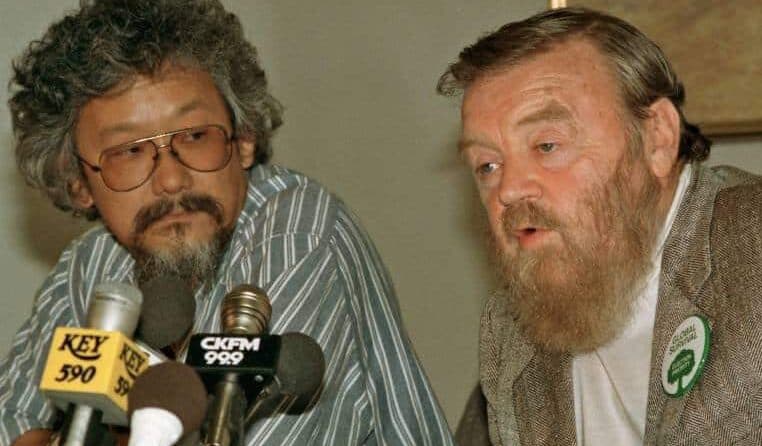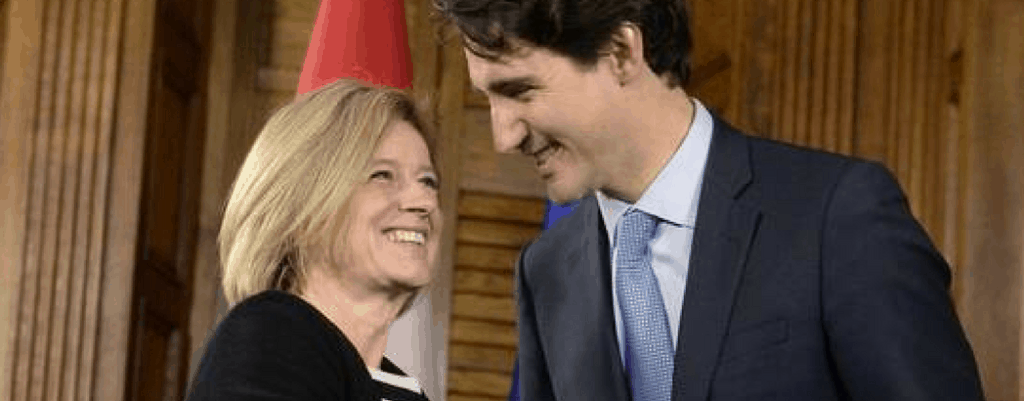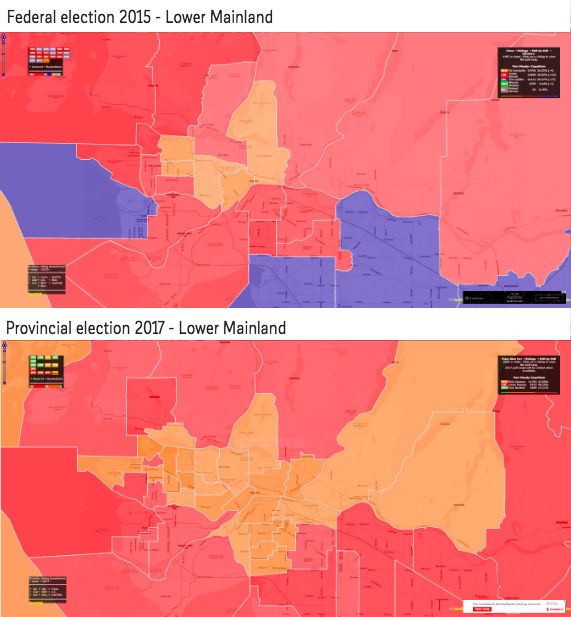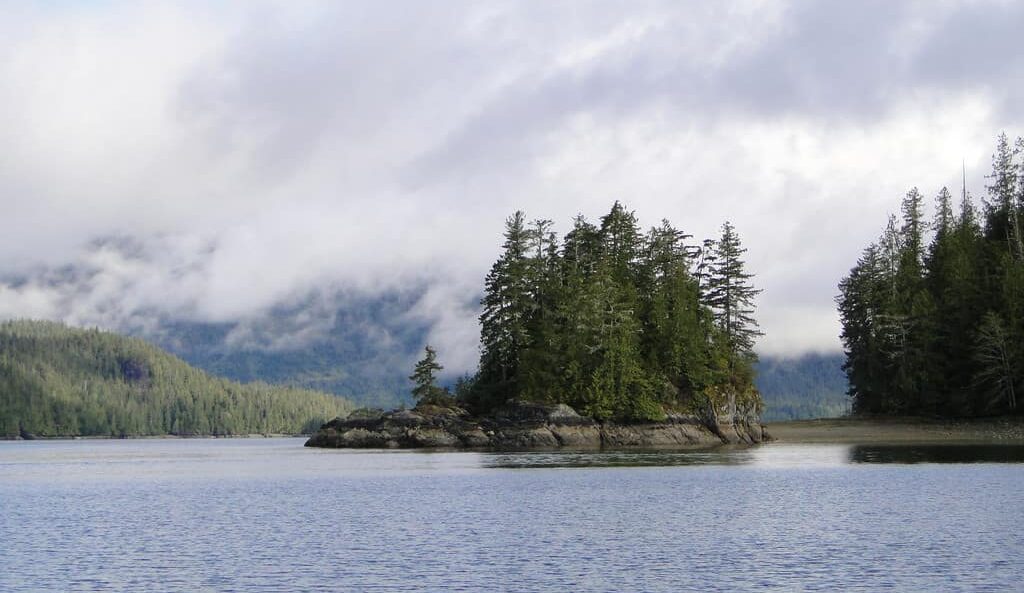If David Suzuki’s ‘campaign of calumny’ is such a big deal, the petrostate must be spooked
The backlash surrounding Dr. David Suzuki receiving an honorary doctorate from the University of Alberta is the best evidence yet that the petrostate stranglehold in Alberta is cracking. Albertan elites are apoplectic, accusing Suzuki of somehow betraying Alberta by criticizing its energy policies and demanding that the university drop Suzuki or face a donor boycott.
Prominent Albertan politicians and leaders from the business, academic, and legal sectors indict Suzuki, claiming he has betrayed Alberta, thumbed his nose at ordinary Albertans, and engaged in a “campaign of calumny” for critiquing the environmental and human-rights impacts of the oilsands. One hyperbolic critic, unintentionally highlighting the much-ado-about-nothing nature of the backlash, claimed this was “the worst crisis we’ve faced in more than three decades.”
Expect more knee-jerk reactions, and flailing, misguided threats from Albertan elites as they attempt to maintain the Petro State, says @willhorter
This is not to say that Dr. Suzuki should be above criticism. In a democracy, no one should be. I have criticized him for his sometimes wildly inconsistent political positions and for the huge volume of emails about lifestyle choices and non-toxic beauty products I continue to get from his eponymous foundation. What a wasteful use of communication from the “most trusted person in Canada.”
Whatever you may think of him, Dr. Suzuki is revered by Canadians including many Albertans. For millions, he has been an inspiration. In fact, since 2006, Dr. Suzuki has scored at or near the top of the Reader’s Digest Most Trusted Canadian poll. That by itself should be enough to justify an honorary degree.
So, I have some questions. What’s really behind all the inflamed rhetoric? Who’s fuelling the backlash? After all, Dr. Suzuki received an honorary degree from the University of Calgary in 1986 without all the kerfuffle, so something clearly isn’t adding up here.
Has Dr. Suzuki changed in the last 30 years, or has Alberta?
What’s clear is that many in Alberta have had their feelings hurt. They feel that they are being picked on, and have chosen Dr. Suzuki as the poster child of their pain. But weren’t Albertans also feeling attacked in 1986 when the host of The Nature of Things got his last honorary degree from an Albertan university? Wasn’t the mid-1980s the “West Wants In” era that incubated the Reform Party in response to Trudeau-the-dad’s infamous National Energy Plan?
So if Alberta being picked on doesn’t fully explain the backlash, what does?
Perhaps the explanation is the collapsing Alberta petrostate. Andrew Nikiforuk and Kevin Taft have written extensively about the hegemonic role Big Oil has played in Alberta’s politics and policies.
The Suzuki backlash is what happens when Big Oil begins to lose its supremacy. It’s a classic tactic that is employed when the empire is under threat: anyone not 100 per cent with the program is the enemy. The recent Trumpification of the United States could be seen as backlash against Obama’s America. The honorary degree kerfuffle is just further evidence of an oilsands-sized insecurity festering in the Albertan elite.
Suzuki’s attackers are not what you would traditionally think of as extremists. They are a who’s-who of Alberta’s academic, political, business, and legal elite. They include opposition leader Jason Kenney; Fraser Forbes, a professor and engineering dean at the University of Alberta; businessman Dennis Erker; and lawyer Robert Iverach. You can almost feel the spit flying out of their mouths they are so outraged. “How dare he?” is the sentiment underlying their indignation.
Apparently, elites in Alberta expect everyone to toe the line, shut up, and support Big Oil and its dominance over Albertan policy. Critics, if they dare open their mouths, should expect to be denounced, and their accomplishments, however noteworthy, ridiculed.
Or, perhaps we should question whether the fact that Dr. Suzuki is Japanese Canadian has anything to do with the over-the-top vehemence of their attacks? It’s worth noting that all Suzuki’s main attackers are white men.
What happened to that fundamental tenet of democracy: reasonable minds can differ? Isn’t that the “golden rule” of democracy — that while we may disagree about policies, we are all still Canadians?
Are Alberta elites anti-democratic? Do they not value free speech? It seems that voices that deviate from the elite’s orthodoxy are regularly attacked, belittled and threatened. It seems that dissent from the ruling canon of Big Oil means you are tantamount to a traitor, worthy of scorn, or perhaps worse.
Oil’s ‘Deep State’
Kevin Taft, former leader of the Alberta Liberal Party and author of the recent book Oil’s Deep State has warned about how democratic institutions in Canada, particularly Alberta, have fallen under the poisonous sway of Big Oil. The subtitle of his book speaks volumes: How the petroleum industry undermines democracy and stops action on global warming – in Alberta, and in Ottawa. Taft argues that Big Oil has captured and harnessed the institutions of democracy in Alberta — and Canada — for its own uses.
Proof of Big Oil’s attempt to dominate is all around us. The Canadian Association of Petroleum Producers (CAPP) recently published a document that lays out their plan to secure “oversight” (their word) of political, civil service, and regulatory institutions in both the Alberta and federal governments.
Jason Kenney, United Conservative leader and front-running candidate to win Alberta’s election next year, inadvertently exposed his belief that the Deep State should extend directly to the Premier’s office. As a matter “economic survival” he has promised, “If elected premier, … he will set up a ‘fully staffed rapid response war room’ and strip protections from ‘bogus charities’ like the David Suzuki Foundation.” As if current Alberta Premier Rachel Notley hasn’t been forceful enough defending Alberta’s Oil Industry or promoting Kinder Morgan.
Clearly, some of Alberta’s elite feels that the University of Alberta somehow belongs to the oil industry. Suzuki’s accusers must think that Notley’s government, Kenney’s opposition, the civil service, universities, and regulators all need to be in lockstep with the oil industry.
Suzuki’s enemies must believe that CAPP’s plan for a whole-of-government lockdown of Alberta’s regulatory and political institutions includes universities and other places of higher learning. As one attacker said, “Hell will freeze over before any oilman makes a personal donation to the U of A after this fiasco.” The threat to withhold millions in donations to an institution of higher learning is just more evidence that Big Oil and their sycophants are willing to sacrifice the broader public interest of Canada to the interests their pet industry.
Only in Alberta?
Contrast the Albertan firestorm over Suzuki with the supposedly rough and tumble politics of its far western neighbour. Imagine, if Daniel Pauly, the world-renowned marine biologist known for criticizing commercial fishing or Alexandra Morton, the citizen scientist known for her opposition to salmon farms were up for honorary degrees from University of British Columbia (UBC). Picture Maureen Bader, former B.C. director of the Canadian Taxpayers Federation and critic of B.C.’s film tax credit regime, getting honoured. Would elites in the B.C. fishing, salmon farming or film industry be willing, or able, to try to extort UBC to withdraw the degree?
It’s absurd even to contemplate, although these industries generate billions for the B.C. economy. The key difference? None of these industries exerts inappropriate dominance over our law and policy. None is hegemonic or controls a Deep State in British Columbia.
The good news is that the University of Alberta withstood the threats and decided to go ahead and honour Dr. Suzuki. This is evidence that not all institutions in Alberta will kowtow to Big Oil (for now). It proves that at least someone in authority in Alberta, University of Alberta’s President, Dr. David Turpin, realizes that what’s good for Big Oil isn’t necessarily good for Alberta, Canada, or the planet. In fact, they are often in direct conflict.
The Alberta backlash against Suzuki is likely only the beginning. Big Oil and Alberta’s elites should get used to losing. Their empire is in decline. The hard truth — which few in Alberta, Bay Street or Ottawa want to acknowledge — is that in coming decades the oil industry must be phased out in Canada and around the world. Doing so is our only chance to avoid catastrophic global warming.
So, expect more knee-jerk reactions, and flailing, misguided threats from Albertan elites as they attempt to maintain the petrostate. It’s standard operating procedure from those that have benefited from a dying empire.
Meanwhile, I’m sure glad I live in British Columbia — as, I’m sure, is Dr. Suzuki.




